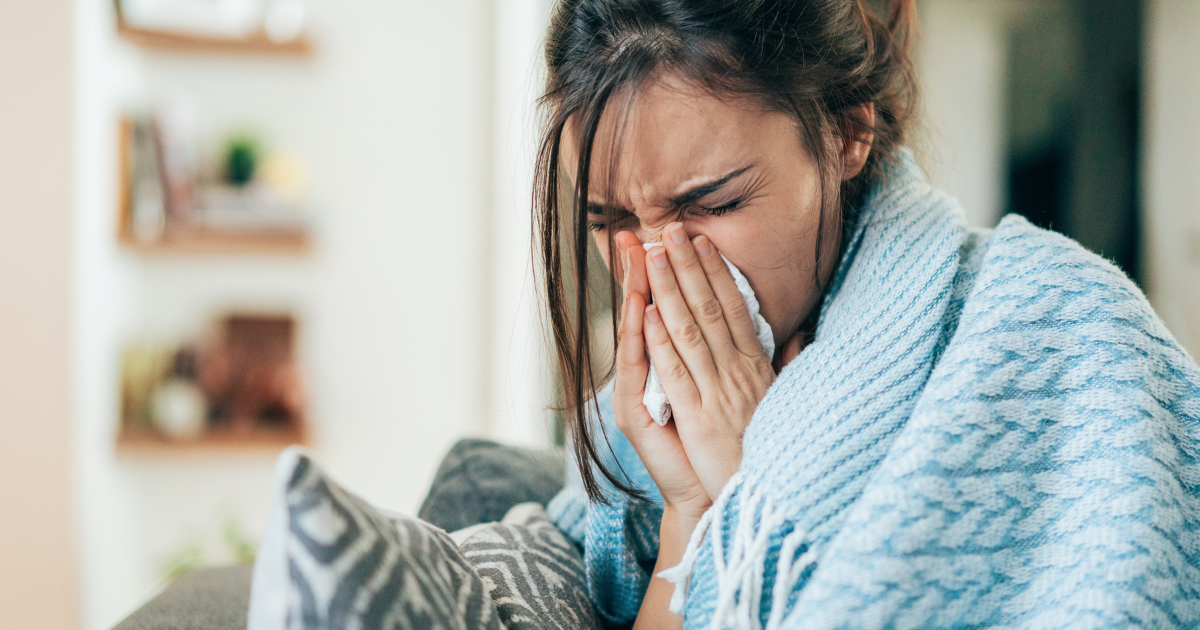It is officially fall, which means seasonal activities like visiting pumpkin patches, apple orchards and taking hayrides are in full swing. As picturesque as the changing leaves are, the fall season also brings seasonal bugs and runny noses. Unfortunately, it’s not always easy to tell if you’re struggling with seasonal allergies, a cold, the flu or even COVID-19 since many symptoms are similar. That’s why it’s important to know the difference so you can take the appropriate steps to keep yourself healthy.
Is it a cold or allergies? Here’s what you need to know.
Cold Symptoms
The symptoms of the common cold can vary from person to person, but they generally include a sore throat, a runny or stuffy nose, sneezing, coughing and watery eyes. You might also have a mild fever, fatigue and mild body aches. Symptoms of a cold typically come on gradually and are usually mild compared to symptoms of other respiratory infections, such as the flu.
The common cold usually resolves on its own without medical treatment. Resting, staying hydrated and taking over-the-counter medications can help manage your symptoms.
What Causes a Cold?
Colds are highly contagious and primarily spread through respiratory droplets when an infected person coughs, sneezes or talks. Touching a surface or object with the virus on it and then touching the face, particularly the nose or mouth can also contribute to transmission.
Colds are more common in the fall and winter, because people tend to spend more time indoors, making it easier for the virus to spread. Additionally, cold viruses often thrive in colder temperatures.
Flu Symptoms
One of the biggest indicators that you are dealing with something more serious than just a cold or allergies is if you have a fever that is 100 degrees or higher. It is unusual to have a fever when you have a common cold, and you will never have a fever if you’re just dealing with allergies.
Other common symptoms of the flu are headaches and severe aches and pains. You may also experience slight aches and pains with a cold, but these will be more intense when you have the flu.
Another clear indication that you have the flu and not just allergies is if you’re experiencing extreme exhaustion. This will usually occur at the beginning of your illness and can linger for weeks. It is unlikely that you will experience this with allergies or a minor cold.
What Causes the Flu?
When you have the flu, your respiratory system is attacked by a viral infection. Your nose, throat and lungs will become infected and cause you to feel run down. The flu virus travels through the air in droplets when an infected person coughs, sneezes or talks. It’s possible to inhale the droplets directly or pick them up from an object and then transfer them to your eyes, nose or mouth.
To keep yourself healthy, you should schedule an appointment with your doctor to get the flu vaccination, as this could help reduce your risk of the flu and lower your chance of suffering from a severe case that requires a hospital stay.
COVID-19 Symptoms
Some individuals infected with the virus may be asymptomatic, meaning they do not show any symptoms despite being infected. Additionally, COVID-19 can lead to severe respiratory illness and complications, especially in older adults and those with underlying health conditions. If you are experiencing symptoms consistent with COVID-19 or have been in close contact with someone who tested positive, it’s important to seek medical advice and get tested.
COVID-19 has a wide range of symptoms, ranging from mild to severe. The most common include fever, cough, shortness of breath or difficulty breathing, fatigue, muscle and body aches, and headache. You may also experience a loss of taste or smell, a sore throat, congestion and gastrointestinal symptoms.
What Causes COVID-19?
COVID-19, short for “coronavirus disease 2019,” is caused by the SARS-CoV-2 virus. It is primarily spread through respiratory droplets produced when an infected person talks, coughs or sneezes. It is most often spread through people who are in close contact with one another, typically within about six feet.
Allergy Symptoms
As opposed to the flu, allergies are often less severe and trigger more minor symptoms. Allergies throughout the fall season typically lead to symptoms like a stuffy or runny nose, sneezing, watery eyes and itchy nose or eyes. These symptoms may also occur if you’re suffering from the flu, so it’s important to check your temperature and evaluate your energy levels to determine if allergies are, in fact, the culprit.
What Causes Airborne Allergies?
Allergies can have many causes, making it difficult to narrow down what exactly you are allergic to. Some common airborne allergy triggers include pollen, dust mites, animal dander and mold.
An allergy emerges when your immune system mistakes a harmless substance for a dangerous one and produces antibodies for the allergen. When your body is exposed to the allergen again, the antibodies attempt to fight it off, triggering the allergy symptoms you experience.
If you can determine what causes you to have allergic reactions, do your best to avoid known triggers. You can also consult your doctor about over-the-counter allergy medicines that can help alleviate your symptoms.
Stay Healthy This Fall with ACV Health
While it’s impossible to avoid fall and winter viruses completely, you can protect yourself by taking preventative measures. We encourage you to maintain healthy habits, wash your hands frequently and stay up to date on all recommended vaccines, including an annual flu shot. Schedule an appointment with ACV Health today to discuss your options with a practitioner.




